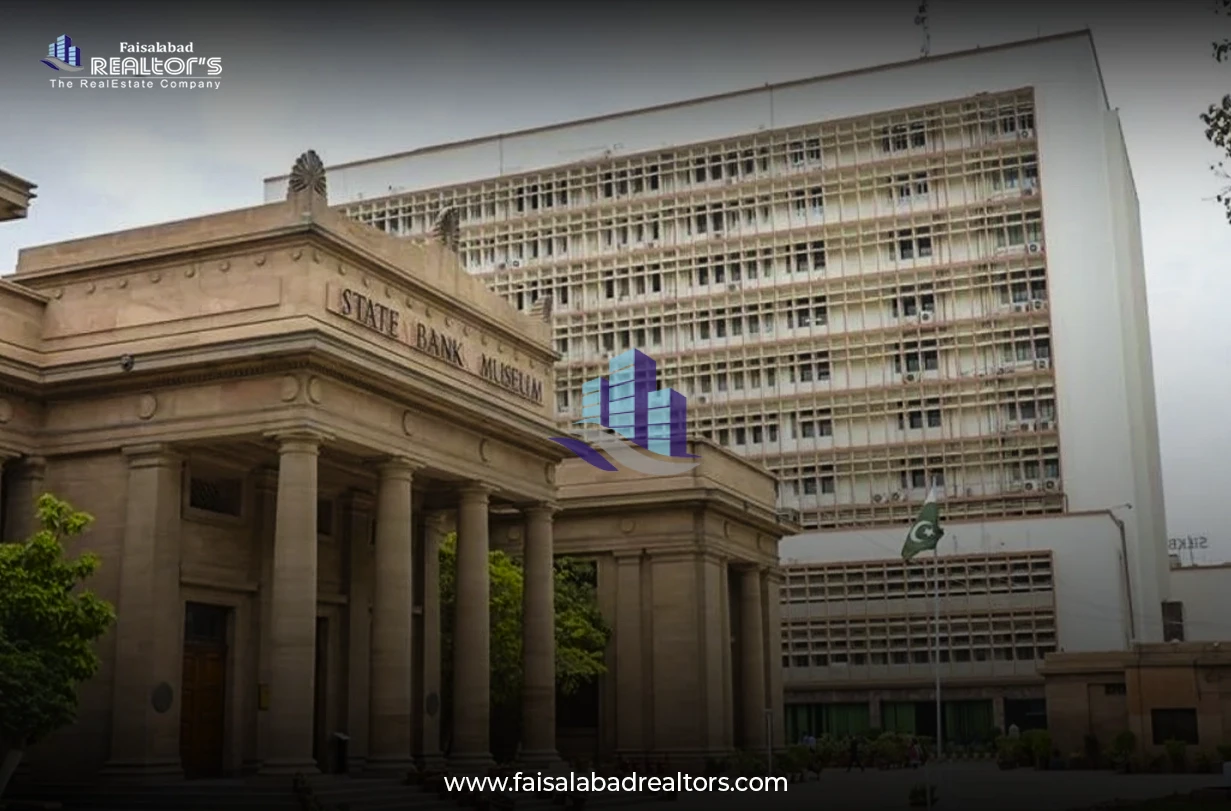The State Bank of Pakistan (SBP) issued a significant statement on December 16, 2024. The Monetary Policy Committee (MPC) lowered the policy interest rate by 2% to 13%, which will take effect on December 17, 2024. A more optimistic view of the economy and improved inflation trends are the primary causes of the rate drop. What this entails for the economy and industries like real estate is examined here.
Inflation Trends
Pakistan's inflation rate has been declining. Lower food costs and the waning impact of the previous year's petrol price increases caused it to fall to 4.9% in November 2024. However, at 9.7%, core inflation, which does not include food and energy, remains strong, indicating that pricing pressures have remained relatively high.
According to the MPC, inflation is expected to stabilize between 5% and 7% in the long run, though it may vary in the medium term. The rate drop is planned to promote financial development and help inflation control.
Economic Growth Outlook
The outlook for Pakistan's economy is improving. The agricultural sector, in particular, is performing better than expected, with cotton arrivals exceeding projections and advantageous signs for the wheat crop. The industrial sector is also growing, especially in textiles, food production, automobiles, and oil.
Business confidence is rising, and economic conditions are easing, supporting further economic expansion. The MPC expects GDP growth for FY25 to be between 2.5% and 3.5%, a sign of positive economic momentum.
External Sector
Pakistan's external sector is showing signs of strength. From July to October FY25, the country's current account exceeded $0.2 billion, driven by significant remittances and solid export performance. Exports, particularly textiles, rice, and oil, grew by 8.7%.
Global item prices have helped reduce Pakistan's import costs, and the gap between the interbank and open market exchange rates has narrowed. These positive factors have also helped boost the SBP's foreign exchange resources, now around $12 billion. The current account is expected to stay balanced, with a projected deficiency of less than 1% of GDP for FY25.
Fiscal Sector
On the fiscal side, the Federal Board of Revenue (FBR) reported a 23% increase in tax revenue from July to November FY25. However, more than this growth is needed to meet the full-year tax target. On the spending side, lower interest rates on domestic debt have helped reduce government costs, but there are still challenges in meeting fiscal targets. The MPC has stressed the need for further reforms to improve the country's fiscal health.
Monetary and Credit Conditions
As of November 2024, broad money (M2) growth slowed to 13.9% year-on-year due to reduced government borrowing. On the other hand, private-sector borrowing has picked up as banks lend more, helping businesses and consumers.
With easier financial conditions, credit growth is picking up, which is good news for many sectors, including real estate. As loans become more affordable, demand for homes and commercial properties is expected to rise.
How Lower Interest Rates Benefit Real Estate?
The decision to lower interest rates is excellent news for the real estate market. Lower interest rates make borrowing money cheaper, increasing demand for residential and commercial properties.
- More Affordable Home Loans: Lower interest rates typically lead to reduced mortgage rates, making home loans more affordable for buyers. This could boost demand for residential properties, particularly among first-time buyers.
- Higher Demand for Property: As borrowing costs decrease, residential and commercial property markets heat up. When people can borrow more affordably, they are more likely to invest in real estate, pushing up demand and property prices.
- Real Estate as a Safe Investment: In times of inflation, real estate is often seen as a safe investment because property values rise over time. With stabilizing inflation, real estate will likely remain a strong investment option.
- Boost to Construction and Economic Growth: As the economy improves, especially in agriculture and industry, demand for residential and commercial properties will likely grow. As a result, urban centers could see increased real estate activity.
Conclusion
The MPC's decision to cut reasonable rates is a positive step for Pakistan's economy. While challenges like inflation and fiscal reforms remain, the overall outlook is encouraging. A better economic environment will benefit key sectors like agriculture, industry, and real estate.
The rate cut will lead to cheaper real estate loans, likely increasing demand for residential and commercial properties. As the economy stabilizes, property values have the potential to increase, making this a good time for property investors.
If you are considering investing in real estate, now could be the right time, as the market will likely see more vigorous growth and higher property values in the coming months.
Contact us for:
Office for rent
Office for sale
Agriculture land
House for sale
House for rent
Room for Rent
Flat for Rent
Ideal Farm House
Commercial Avenues
Related posts:
The Kisan Card (کسان کارڈ) is a government initiative under the Kisan Credit Card Scheme. This is for supporting farmers in Punjab. The Kisan Card is a financial and agricultural support card introduced by the Punjab government under the CM...
Aminpur Bangla, also called and written as Aminpur or Ameenpur Bangla. It is a rapidly expanding town. This is situated between Chiniot and Faisalabad. Aminpur Bangla is becoming a major real estate destination for developers. It is also best for...


 Kisan Card Punjab: Complete Guide to Kisan Credit Card Scheme 2026
Kisan Card Punjab: Complete Guide to Kisan Credit Card Scheme 2026
 Aminpur Bangla – A Growing Real Estate Hub Near Faisalabad
Aminpur Bangla – A Growing Real Estate Hub Near Faisalabad
 How to Buy a Plot in Pakistan – A Complete Guide by Faisalabad Realtors
How to Buy a Plot in Pakistan – A Complete Guide by Faisalabad Realtors
 Why Location Matters in Real Estate: A Complete Guide
Why Location Matters in Real Estate: A Complete Guide
 Plot vs Plot File in Pakistan – A Complete Real Estate Guide
Plot vs Plot File in Pakistan – A Complete Real Estate Guide